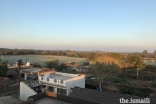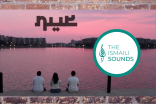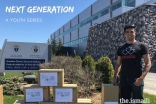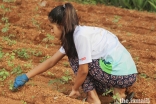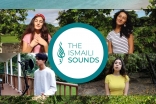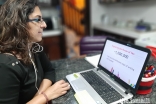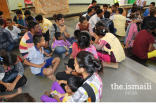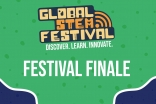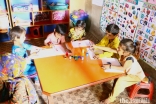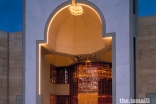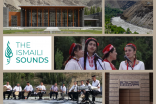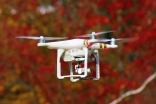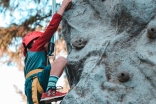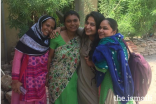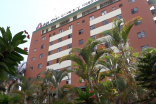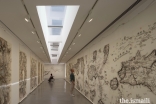Content Tagged with app
As India rapidly urbanizes, pockets of rural Gujarat continue to remain home to smaller communities of the Jamat. Anchored to their land and with strong ties to their community, they often live in areas that are seismically active. Since 2012, the Aga Khan Agency for Habitat’s Rural Habitat Development Programme, has focused on working with these communities to improve the resilience and safety of their built environment. In transforming their living spaces from houses to homes, the programme has helped improve residents’ quality of life.
The Ismaili is pleased to present an original composition entitled Nur by Conchord, a musical trio based in the United States. The lyrics contain themes of Divine Light and the grace of God, and the song features an English translation of ayat an-Nur from the Qur’an.
The Ismaili is pleased to present Shab-e-Didam, a song in praise of Hazrat Ali. This rendition is performed by the DN Khorog Band from Tajikistan.
From supporting high school students applying to university, to generating awareness about the pandemic, to distributing personal protective equipment in remote communities, Ismaili youth from around the world have taken action to respond to the coronavirus outbreak.
A group of Ismaili students from Afghanistan and Tajikistan made the most of a difficult situation when they were unable to return home from the Aga Khan Academy in Hyderabad during the Covid-19 pandemic. With the abundance of spare time they were suddenly given, the students planned and implemented an organic farm on the school grounds.
Presenting Everything's Gonna Be Alright by the Pamoja Ensemble, made up of artistes from Kenya and South Africa, who came together virtually and composed this song of hope and faith.
The Covid-19 pandemic has forced teachers and students around the world to make an abrupt transition from classrooms to remote learning as schools, universities, and religious education centres were closed. Teachers redesigned lessons and adapted to the new reality of keeping students engaged virtually. Meanwhile, students adjusted to learning online without the ease of classroom interactions. Ismaili teachers and students around the world have risen to this challenge and are finding ways to embrace remote learning and tap into the opportunities it offers.
Year after year, “Aashayein”, a programme by the Aga Khan Youth and Sports Board for India (AKYSB,I) has been a catalyst for change for youth from the Saurashtra Jamat. Originally, organised as a residential camp in Hyderabad, Aashayein provides a platform for youth from the remote villages of Saurashtra to immerse themselves in a 21-day journey replete with experiential learning. Through a wide range of interactive activities and workshops, it exposes them to a world of opportunities that lie beyond their villages in Gujarat. As a result, many youth subsequently migrate from Saurashtra to larger cities, in pursuit of a better future. While the 2020 camp remains on hold due to the pandemic, we reflect on how the camps in previous years, have given the Aashayein alumni, the freedom to reach for more.
In recent years, the world has continued to grapple with the challenges posed by global health issues; from cancer to dementia to HIV. Around the world, Ismaili youth have been taking action to research, combat, and educate about these challenges and their associated risk factors.
This weekend, the Aga Khan Education Boards are hosting the inaugural Global STEM Festival Finale. Over recent weeks, participants from 20 jurisdictions around the world engaged in activities and experiments so as to better understand the world around us, and develop important skills for the future.
Based in Geneva, Dr Walraven has direct management responsibility for the Aga Khan Health Service Companies, located in South and Central Asia, East Africa, and the Middle East. In this interview, he explains the value and importance of wearing a face mask in our continued fight against Covid-19.
The Ismaili is pleased to present Dua-e-Reham, a well-known and beloved poem set to music, and performed by Faisal Amlani, Nafeesa Dhalwani, and Tanzeel Bhaidani, with music by Alishah Wadsaria. The timeless lyrics were authored by the esteemed poet-philosopher Muhammad Iqbal over a century ago, and encourage us to exemplify universal ethics by being good citizens and showing compassion to those less fortunate than ourselves.
The clock reads 6 AM and Karima Rehmani is already at work on a Zoom call, talking with colleagues in Boston and Pakistan about everything ranging from children’s art activities to Covid-19 training for teachers and government officials in rural Sindh.
Thirty-five years ago, on 23 August 1985, the then Canadian Prime Minister, The Right Honourable Brian Mulroney, officially opened the Ismaili Centre Vancouver in the presence of Mawlana Hazar Imam, marking a moment of great historical significance for the Jamat in Canada and around the world.
The Ismaili is pleased to present Mazee Balayem, performed by the Yusuf Khirad Band at the Ismaili Jamatkhana and Centre in Khorog, Tajikistan, in 2019. The lyrics, attributed to Jalal al-Din Rumi, express the complexity of human existence and the importance of zikr. The musical composition is a blend of traditional Central Asian instruments such as the daf, doirah, rubab, and sehtar, and modern instruments including the keyboard and guitar.
The current healthcare crisis is accelerating the pace of change, and new innovations that were expected to take a decade to develop are now being tested and marketed at a dizzying rate, which has consequences for almost all organisations and employees.
The playing out of events over recent months has caused many of us to experience a rollercoaster of emotions. Some of us may have felt distress, perhaps taking it out on others around us, some will have felt curious to learn new skills, while others may have felt like curling up into an anxious ball, worrying about what this means for the future.
Since 1999, with endorsement from the UN General Assembly, the 12th of August has been celebrated every year as International Youth Day. This day gives us the opportunity to celebrate the voices, actions, and impactful initiatives of our youth, and recognize their role in shaping our social, economic, and political institutions. The theme of this year’s International Youth Day is “Youth Engagement for Global Action”. In line with this theme, the Ismaili India is proud to share stories of three of our young achievers, whose work in the field of public policy, governance, and development, is truly serving to ignite change and inspire hope.
Professor Mansoor Saleh of the Aga Khan University Hospital, Nairobi explains the partnership with Roche Pharmaceuticals Kenya, as both institutions participate in a global clinical trial for potential treatment of Covid-19 associated pneumonia.
A group of young students from the Middle East Jamat had the chance to visit a series of architectural works and explore how the study of architecture can help to better understand the beliefs, values, technology, and history of various civilizations.


